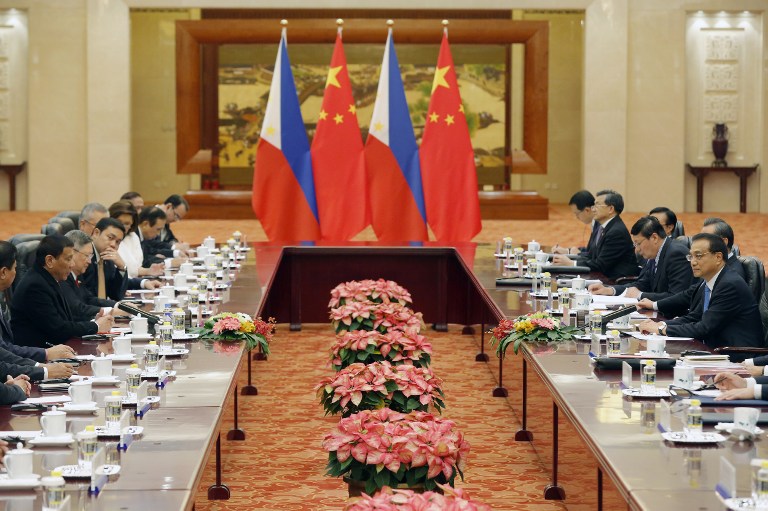BCDA: No deals, just MOU with Chinese firms for studies

Chinese Premier Li Keqiang (right ) and President Rodrigo Duterte (left) attend a meeting at the Great Hall of the People in Beijing on Oct. 20. Duterte met with his Chinese counterpart Xi on Oct. 20 as the Philippine leader seeks closer ties with the Asian giant while blasting his US allies. AFP
There are no contracts, just Bases Conversion Development Authority (BCDA) memoranda of understanding (MOU) with the Chinese companies for feasibility studies.
But BCDA president and chief executive officer Vince Dizon did not give a categorical answer when asked if he knew the companies he was dealing with were banned by the World Bank from participating in all road and bridge projects funded by the international financial institution.
In a statement, Dizon [no relation to the Inquirer reporter] said that while BCDA admired the “diligence of the Philippine Daily Inquirer in finding the World Bank document regarding CCCC [China Communication Construction Company] and its subsidiaries … the same diligence should have been exercised in simply reading the MOU that was signed which very clearly states that the MOU is only for the conduct of a study for the project at the cost of the Chinese company and not the Philippine government.”
“It is by no means an award of the contract… We are very far from that point in the process, we are only at step 1—the feasibility study—and to make an assertion that the project has already been ‘bagged’ or awarded to a company is completely false and irresponsible,” Dizon said.
READ: Chinese company banned by World Bank bags PH infrastructure project
When asked if he knew about the World Bank’s debarment of China Road and Bridge Corp. (CRBC) and China Harbour Engineering Co., Ltd., (CHEC), the BCDA chief replied:
“We would like to reiterate and reassure the Inquirer, [Inquirer reporter] Ms Dizon and the public, that when the project finally reaches the stage of implementation, it will go through the most rigorous, stringent, and transparent procurement rules of the Philippines, and if any company is deemed banned or unqualified then they will not be allowed to participate in the bidding process.”
The World Bank ban on CRBC, its parent company, CCCC Ltd., and consequently CHEC as a subsidiary, is enforced until Jan. 11, 2017, or three months from now.
The BCDA’s MOUs with the two Chinese companies are effective from the date of their signing and would be “valid for 12 months, extendible for another 12 months” as long as they send a written notice to BCDA two months before the expiration of the initial period.
According to the World Bank, the debarment on CCC, CRBC, and CHEC, could be reduced to three years, if after “five years of the date of ineligibility, CCCC has put in place an effective corporate compliance program acceptable to the World Bank and has implemented this program in a manner satisfactory to the World Bank.”
The World Bank debarred CRBC in 2009 after its internal investigation showed that the company colluded with several Filipino and foreign companies in the bidding process for the first phase of the Philippine National Roads Improvement and Management Program (NRIMP1).
The ban was extended to CRBC’s parent company, CCCC and its subsidiaries, including CHEC, in 2011.
Corruption watchdogs in other countries protested their governments’ contracts with CCCC and its subsidiaries, citing their World Bank debarment.
Dizon said that the MOUs were “nonexclusive” and did not preclude the government from “considering other groups or companies interested in the project.”
The MOUs were borne out of the recent state visit of President Rodrigo Duterte to Beijing, where he secured $24 billion worth of investment and credit line pledges.
Trade Secretary Ramon Lopez later announced that $15 billion worth of 26 investment projects were signed, including the Bonifacio Global City-Ninoy Aquino International Airport segment of the Metro Manila Bus Rapid Transit-Edsa project and the 65-km Subic-Clark Railway project (SCRP) that will traverse through the Subic-Clark-Tarlac Expressway (SCTEx).
BCDA said CRBC expressed interest in the BGC-Naia project while CHEC was interested in the SCRP project.
The SCRP was highlighted in the MOU as one of the “top priority development infrastructures intended to be implemented during the term of the Duterte administration.”
The BGC-Naia is a segment of the Metro Manila-BRT system approved last September by the National Economic Development Authority (Neda) Board headed by the President that aims to provide alternative mass transit in Metro Manila.
RELATED STORIES